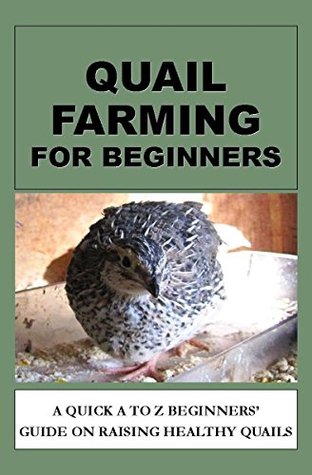Kindle Notes & Highlights
Read between
November 7 - November 23, 2021
Using a candling lamp, a fertile egg will exhibit a reddish embryo while an infertile one will show a clear embryo.
you should religiously turn the eggs with a 1800, three times in 24 hours (to ensure uniform heating), except during the last three days to hatching (day 15 and onwards).
average of 18 to 24 days to hatch.
14 to 17 days to hatch.
the hatching rate of quail eggs is usually high for eggs presented for incubation seven or eight days and below from the day they are laid.
store them in a humid room with pointed ends facing downwards.
incubate eggs which are utmost 7-8 days old and below.
Quail chicks take an average of 18-24 days to hatch
they usually have an attachment of egg yolk in their lower body (abdomen).
they need it as a source of food for the first few days (two days) as they acclimatize w...
This highlight has been truncated due to consecutive passage length restrictions.
To prevent the chicks from drowning in water troughs, you should half-fill the water troughs with small-sized marbles.
Source of heat: This is necessary to help heat or regulate the temperature inside the brooder.
verify this is by use of a thermometer and, or by closely observing the behavior, movements or positions of the chicks around the heating source.
When the brooder is correctly heated, the chicks should be evenly spread and will be seen to be normally going about their business.
temperature inside the brooder should be maintained at 95F during the first week.
Afterwards, it should be lowered by at least 5F on each passing week until the 4th week when the birds should be ready to be taken out of the brooder.
you should withdraw the source of heat by the fourth week to allow the birds adapt to th...
This highlight has been truncated due to consecutive passage length restrictions.
litter may be in form of sawdust or wood shavings.
The waterers should be constructed in such a way the chicks cannot step or defecate on them.
Half-fill the waterers with marbles to bar the chicks from drowning in them.
leading causes of early mortality of quail chicks is drowning in the waterers.
And after two to three weeks, you can remove the marbles from the drinking water.
The feeders too, should be constructed in such a way the chicks cannot step or defecate on them.
you can feed them on game bird feeds /turkey feeds (a starter with an average protein component of 25%).
Since quails start laying eggs at 6 weeks old, you should change the feeds to layers mash as the birds approach that egg laying stage.
Avoid mixing different quail breeds as they may not be friendly to one another,
Unfertilized eggs: When you raise female quails in isolation from male quails, the female quails will eventually lay unfertilized eggs once they reach the egg-laying stage.
absence of mating between mature male and mature female quails which result into laying of the unfertilized eggs
Quail chicks: After successful completion of the incubation period, fertilized quail eggs would hatch into chicks.
focus on production of a few days old quail chicks since it is the most preferred age to acquire and start raising quails.
Point of lay quail birds: These quails are between the ages of five to six weeks.
Manure: Quails’ wastes are a useful by-product for farming purposes.
with high levels of nitrogen.
you should pair one male to two females, or one male to utmost three females. These are the most recommended ratios if you intend to get eggs which are 99.9% fertilized.
The cages are specially built using wood and wire mesh with spaces of 2sq ft per bird.
¼ inch of wire mesh would be best ideal to use in constructing the floor of the cages, however, in most instances, it doesn’t effectively permit quails’ dropping to pass through.
½ inch of wire mesh would be appropriate. But as you settle on using ½ inch of wire mesh, you must consider the birds’ predators which might be lurking in the area.
Consider spreading wood shavings or saw dust on the floor of the pen. They will aid absorbing the birds’ droppings to form dry crumbs which are easy to clean out of the coop.
Immediately quail chicks are hatched, start them off with “chick starter”.
usually rich in proteins
Feed them on the starter feeds until they...
This highlight has been truncated due to consecutive passage length restrictions.
you can feed them on game bird feeds /turkey feeds (a starter feed with an average protein component of 25%).
growers mash, for male quails (broilers) and for female quails (hens).
Non-medicated game bird feed is invaluably ideal to give to the birds as it rich in proteins.
the absence of commercial feeds, the birds can feed on soya meals, groundnut cakes, fish meals, sorghum, sunflower cakes, maize seeds (corn seeds), deoiled rice bran etc.
give them grit to help them improve on their digestion of consumed feeds.
kitchen scraps such as sweet corn, grated carrot, and broccoli, chunks of apple, lettuce, cut cabbages and even peas.
millet or mealworms.
avoid mixing chickens with quail birds under the same housing.
Sick quails usually appear numb and un-alert.


